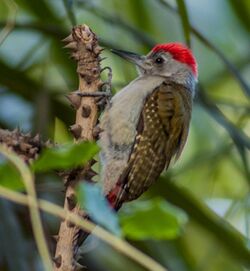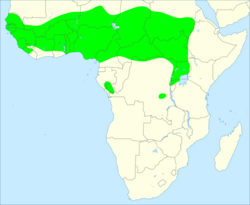Biology:African grey woodpecker
| African grey woodpecker | |
|---|---|

| |
| Scientific classification | |
| Domain: | Eukaryota |
| Kingdom: | Animalia |
| Phylum: | Chordata |
| Class: | Aves |
| Order: | Piciformes |
| Family: | Picidae |
| Genus: | Dendropicos |
| Species: | D. goertae
|
| Binomial name | |
| Dendropicos goertae (Müller, PLS, 1776)
| |

| |
| Geographic distribution shown in green | |
| Synonyms | |
| |
The African grey woodpecker (Dendropicos goertae) is a species of bird in the woodpecker family Picidae. Is a widespread and frequently common resident breeder in much of Sub-Saharan and equatorial Africa. It is a species associated with forest and bush which nests in a tree hole, often in an oil palm, laying two to four eggs.[3] It is a common bird with a very wide range, and the International Union for Conservation of Nature has rated its conservation status as being of "least concern".[1]
Taxonomy
The African grey woodpecker was described by the German zoologist Philipp Ludwig Statius Müller in 1776 from a specimen collected in Senegal. He coined the binomial name Picus goertae.[4] The specific epithet is from the French polymath Comte de Buffon who noted that "Goërtan" was the name used for the species in Senegal.[5][6] The species was also illustrated in a set of plates that accompanied Brisson's work.[7] The African grey woodpecker is now placed in the genus Dendropicos that was introduced by the French ornithologist Alfred Malherbe in 1849.[8][9]
Five subspecies are recognised:[9]
- D. g. koenigi (Neumann, 1903) – Mali to west Sudan
- D. g. abessinicus (Reichenow, 1900) – east Sudan to west Ethiopia
- D. g. goertae (Müller, PLS, 1776) – Senegal and Gambia to Mali.
- D. g. centralis (Reichenow, 1900) – Sierra Leone to Nigeria, south Sudan, west Kenya and northwest Tanzania
- D. g. meridionalis Louette & Prigogine, 1982 – south Gabon and northwest Angola to south central Democratic Republic of the Congo
The African grey woodpecker and the eastern grey woodpecker (Picidae spodocephalus) were formerly treated as conspecific.[9]
Description
Like other woodpeckers, this species has a straight pointed bill, a stiff tail to provide support against tree trunks, and zygodactyl or “yoked" feet, with two toes pointing forward, and two backward. The long tongue can be darted forward to capture insects. This bird is 20 cm (7.9 in) in length. It is a typical woodpecker shape, and has unmarked green upperparts and a pale grey head and underparts. The rump is red, and there is a small red belly patch. The short tail is blackish. The adult male grey woodpecker has a red crown. Females have a plain grey head, lacking the red crown. Young birds are like the female, but the reds are paler, and there may be some flank barring.[10]
Distribution and habitat
The African grey woodpecker is native to tropical parts of western and central Africa. Its range includes Angola, Benin, Burkina Faso, Burundi, Cameroon, Central African Republic, Chad, Congo, Democratic Republic of Congo, Equatorial Guinea, Eritrea, Ethiopia, Gabon, Gambia, Ghana, Guinea, Guinea-Bissau, Ivory Coast, Kenya, Liberia, Mali, Mauritania, Niger, Nigeria, Rwanda, Senegal, Sierra Leone, South Sudan, Sudan, Tanzania, Togo and Uganda.[1] Its typical habitat includes woodland, savannah with isolated trees, copses of larger trees, riverside forest and pasture.[3]
Behaviour and ecology
Like other woodpeckers, this species is an insectivore. It is frequently seen, and regularly taps or drums. The call is a loud and fast peet-peet-peet-peet.
References
- ↑ Jump up to: 1.0 1.1 1.2 BirdLife International (2016). "Dendropicos goertae". IUCN Red List of Threatened Species 2016: e.T22730269A95026074. doi:10.2305/IUCN.UK.2016-3.RLTS.T22730269A95026074.en. https://www.iucnredlist.org/species/22730269/95026074. Retrieved 13 November 2021.
- ↑ Peters, James Lee, ed (1948). Check-List of Birds of the World. 6. Cambridge, Massachusetts: Harvard University Press. p. 220. https://www.biodiversitylibrary.org/page/14477653.
- ↑ Jump up to: 3.0 3.1 "Grey woodpecker (Dendropicos goertae)". Handbook of the Birds of the World Alive.. Lynx Edicions, Barcelona. http://www.hbw.com/node/56205.
- ↑ Statius Müller, Philipp Ludwig (1776) (in German). Des Ritters Carl von Linné Königlich Schwedischen Lelbarztes uc. uc. vollständigen Natursystems Supplements und Register-Band über alle sechs Theile oder Classen des Thierreichs mit einer ausführlichen Erklärung ausgefertiget. Nürnberg: Gabriel Nicolaus Raspe. p. 91. https://www.biodiversitylibrary.org/page/51217742.
- ↑ Buffon, Georges-Louis Leclerc de (1780). "Le Goertan ou Pic vert du Sénégal" (in French). Histoire Naturelle des Oiseaux. 13. Paris: De l'Imprimerie Royale. p. 36. https://www.biodiversitylibrary.org/page/42410461.
- ↑ Jobling, James A. (2010). The Helm Dictionary of Scientific Bird Names. London: Christopher Helm. p. 175. ISBN 978-1-4081-2501-4.
- ↑ Buffon, Georges-Louis Leclerc de; Martinet, François-Nicolas; Daubenton, Edme-Louis; Daubenton, Louis-Jean-Marie (1765–1783). "Pic appellé Goetran, du Sénégal". Planches Enluminées D'Histoire Naturelle. 4. Paris: De L'Imprimerie Royale. Plate 320. https://www.biodiversitylibrary.org/page/35205155.
- ↑ Malherbe, Alfred (1849). "Nouvelle classification des picinée ou pics" (in French). Mémoires de l'Académie nationale de Metz 30: 316, 338. http://gallica.bnf.fr/ark:/12148/bpt6k33229k/f328.image.
- ↑ Jump up to: 9.0 9.1 9.2 Gill, Frank; Donsker, David; Rasmussen, Pamela, eds (2020). "Woodpeckers". IOC World Bird List Version 10.1. International Ornithologists' Union. http://www.worldbirdnames.org/bow/woodpeckers/.
- ↑ Hans Winkler; David A. Christie (2010). Woodpeckers. Bloomsbury Publishing. p. 84. ISBN 978-1-4081-3504-4. https://books.google.com/books?id=GCLgskRFt7IC&pg=PT4.
External links
Wikidata ☰ Q946681 entry
 |


